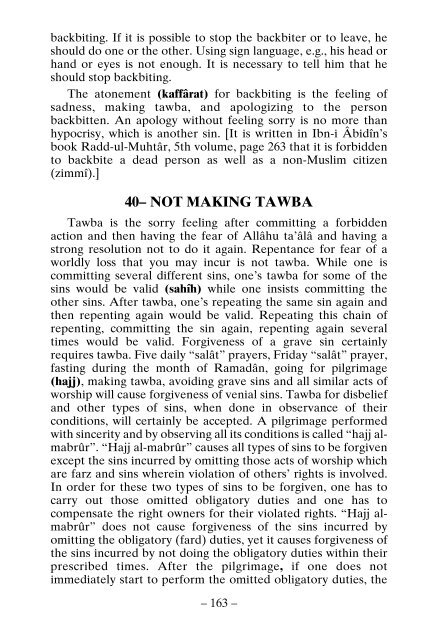Ethics of Islam
Ethics of Islam is taken from the book Berîka by Muhammad Hâdimi. Immorality and ways to get rid of it; 40 depravities and cures to them; usefulness of ethics; what is a soul; strengths of a soul; Personalities emanating from wisdom, courage, chastity and justice are extensively explained.
Ethics of Islam is taken from the book Berîka by Muhammad Hâdimi. Immorality and ways to get rid of it; 40 depravities and cures to them; usefulness of ethics; what is a soul; strengths of a soul; Personalities emanating from wisdom, courage, chastity and justice are extensively explained.
Create successful ePaper yourself
Turn your PDF publications into a flip-book with our unique Google optimized e-Paper software.
ackbiting. If it is possible to stop the backbiter or to leave, he<br />
should do one or the other. Using sign language, e.g., his head or<br />
hand or eyes is not enough. It is necessary to tell him that he<br />
should stop backbiting.<br />
The atonement (kaffârat) for backbiting is the feeling <strong>of</strong><br />
sadness, making tawba, and apologizing to the person<br />
backbitten. An apology without feeling sorry is no more than<br />
hypocrisy, which is another sin. [It is written in Ibn-i Âbidîn’s<br />
book Radd-ul-Muhtâr, 5th volume, page 263 that it is forbidden<br />
to backbite a dead person as well as a non-Muslim citizen<br />
(zimmî).]<br />
40– NOT MAKING TAWBA<br />
Tawba is the sorry feeling after committing a forbidden<br />
action and then having the fear <strong>of</strong> Allâhu ta’âlâ and having a<br />
strong resolution not to do it again. Repentance for fear <strong>of</strong> a<br />
worldly loss that you may incur is not tawba. While one is<br />
committing several different sins, one’s tawba for some <strong>of</strong> the<br />
sins would be valid (sahîh) while one insists committing the<br />
other sins. After tawba, one’s repeating the same sin again and<br />
then repenting again would be valid. Repeating this chain <strong>of</strong><br />
repenting, committing the sin again, repenting again several<br />
times would be valid. Forgiveness <strong>of</strong> a grave sin certainly<br />
requires tawba. Five daily “salât” prayers, Friday “salât” prayer,<br />
fasting during the month <strong>of</strong> Ramadân, going for pilgrimage<br />
(hajj), making tawba, avoiding grave sins and all similar acts <strong>of</strong><br />
worship will cause forgiveness <strong>of</strong> venial sins. Tawba for disbelief<br />
and other types <strong>of</strong> sins, when done in observance <strong>of</strong> their<br />
conditions, will certainly be accepted. A pilgrimage performed<br />
with sincerity and by observing all its conditions is called “hajj almabrûr”.<br />
“Hajj al-mabrûr” causes all types <strong>of</strong> sins to be forgiven<br />
except the sins incurred by omitting those acts <strong>of</strong> worship which<br />
are farz and sins wherein violation <strong>of</strong> others’ rights is involved.<br />
In order for these two types <strong>of</strong> sins to be forgiven, one has to<br />
carry out those omitted obligatory duties and one has to<br />
compensate the right owners for their violated rights. “Hajj almabrûr”<br />
does not cause forgiveness <strong>of</strong> the sins incurred by<br />
omitting the obligatory (fard) duties, yet it causes forgiveness <strong>of</strong><br />
the sins incurred by not doing the obligatory duties within their<br />
prescribed times. After the pilgrimage, if one does not<br />
immediately start to perform the omitted obligatory duties, the<br />
– 163 –

















